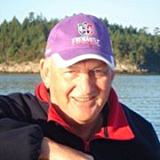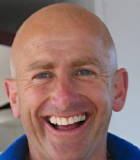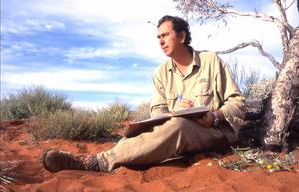Angela Sanders
/BSc Environmental Science - Ecology
Email address: asanders@bushheritage.org.au
Areas of Interest and Experience
Restoration ecology, ecological monitoring, conservation property management.

A large number of scientists work in the Great Southern region - search here for a specialist in your area.

BSc Environmental Science - Ecology
Email address: asanders@bushheritage.org.au
Areas of Interest and Experience
Restoration ecology, ecological monitoring, conservation property management.

Atlanta Veld
Email address:
Atlantav@albany.wa.gov.au
Summary of research and interests:
Made in Hong Kong, born in New Zealand and raised in the stunning Otway Ranges of Victoria were the eclectic foundations for Atlanta's journey to becoming a passionate Citizen Scientist. Atlanta travelled all over Australia before settling in Albany ten years ago, where she decided to formalise her knowledge. Her studies on the Long-necked Turtle in 2007 won her Student of the Year and encouraged her to delve deeper into honing her scientific skills. While completing a degree in Restoration Ecology, she continued her survey work of the turtles and is now recognised locally as the "go to" girl for all things turtle. She encourages everyone to remember the dream, take a leap of faith in their abilities and give it a go. It's the journey not the destination that matters.

Dr Barbara Cook, BSc PhD Cape Town
Key research
Biodiversity and systematics, conservation, freshwater ecology
Email address: barbara.cook@uwa.edu.au
Phone: 9842 0837
Acting Director/IWC Associate Professor in Restoration Ecology
Institution
Centre of Excellence in Natural Resource Management
Areas of Interest and Experience
Barbara Cook has extensive experience in the collection, analysis and interpretation of river and wetland biological and biodiversity data in Western Australia, especially in the South Coast and South West Natural Resource Management regions. She has published over 100 papers, book chapters, reports and conference presentations on various aspects of the ecology of rivers and the biology and genetics of in-stream fauna. She is currently engaged in several projects which involve the determination of the ecological character of Western Australian waterways and wetlands. She is presently investigating the ecological values of South Coast rivers in partnership with the Western Australian Department of Water. Barbara also has extensive experience in researching the systematics and biogeography of selected components of biodiversity.

Winthrop Professor Dale Roberts
Email address:
dale.roberts@uwa.edu.au
Phone: 9842 0867
Institution
Centre of Excellence in Natural Resource Management
Key research:
Biogeography and speciation: Australia - particularly south-Western Australia
Anuran biology: frogs
Sexual selection and sperm competition: polyandrous mating systems
Animal acoustics
Conservation and restoration biology

Dr David Bennett - BSc (Agric Hons) London 1956, PhD (Science) London 1968
Summary of research interests
The role of politics and economics in Natural Resource Management. Most of the problems that David has helped to resolve are where human activities are having serious impacts on climate, land and/or water.
Institution
Retired, but involved in the Mathematicians in Schools Project at Little Grove Primary School
Short biography
David has been working on natural resource problems since 1961. After twenty years of research for CSIRO, he was the Wesfarmers Professor of Rural Management for Curtin University and, as well, worked on rural issues for the Western Australian Government. He established his own company NRMC Pty Ltd Natural Resources Management Consultants in 1986, but has also devoted a lot of his time to voluntary activities mainly within the conservation movement.

Gary Muir
Email address:
wow@denmarkwa.net.au
Summary of scientific interests:
Gary Muir is a science communicator, involved in science education and nature based science research, facilitating teams that incorporate nature based scientists. For the past 20 years he has been an EcoGuide for WOW Wilderness based in Walpole. He has personally interpreted the natural sciences to over 150,000 people, raising their awareness and understanding of the environment and their role within it. Gary first worked for ten years in environmental management with the Department of Conservation and Land Management and was involved in natural reprocessing. Since graduating he has secured a position with Mount Romance - the world's largest exporter of sandalwood oil - where he is responsible for the review and improvement of documentation relating to the manufacturing practises.

Email address: Mark.true@dpaw.wa.gov.au
Phone: 9846 4276 or
Mobile 0428 464 276
Institution
Department of Parks and Wildlife
Current area of interest
Herpetology
Threatened fauna conservation
National Parks and Nature Reserve management
Nature conservation education

Dr Peter Speldewinde - BSc (hons) PhD (UWA)
Key research
Impacts of ecosystem degradation on human health
Ecology and conservation of Australian native rodents
Email address: peter.speldewinde@uwa.edu.au
Phone: 9842 0845
IWC Lecturer in Restoration Ecology
Institution
Centre of Excellence in Natural Resource Management
Areas of Interest and Experience
Dr Peter Speldewinde worked for many years in the field of conservation biology, implementing recovery plans and translocation proposals for threatened species. After working in the field of landcare for a number of years Peter did his PhD at the University of Western Australia, examining the impacts of dryland salinity on human health. He is currently involved in coordinating the honours year for the 'Restoration Ecology' degree and a unit in the International Water Centre's Master of Integrated Water Management. His research interest is the effects of ecosystem health on human health and he maintains an interest in Australian native rodents.

Dr Sarah Barrett, PhD Biological Sciences
Email address: Sarah.barrett@dpaw.wa.gov.au
Current area of research interests:
Conservation biology of threatened flora and ecological communities

Winthrop Professor Stephen Hopper
Email address:
steve.hopper@uwa.edu.au
Phone: 9842 0842
Key research:
Granite outcrop plants of the world - biogeography, evolution and conservation
Haemodoraceae - phylogenetics, biology and conservation
Old, climatically-buffered, infertile landscapes (OCBILs) - evolution, ecology and conservation of biodiversity
Systematics, evolution and conservation of Australian orchids
Systematics and conservation of Western Australian eucalypts
Collaborative cross-cultural knowledge systems of biodiversity - Noongar and western science
Institution
Centre of Excellence in Natural Resource Management
Areas of Interest and Experience
I am a conservation biologist, trained and widely published in in evolution, ecology and taxonomy. My research and teaching interests are broad, with specialist expertise in eucalypts, the plant family Haemodoraceae (containing kangaroo paws), orchids, plants of granite outcrops, rare plants and pollination by vertebrates.
I have worked in the Western Australian Government, at the University of Western Australia, and been Director of two world class botanic gardens, while maintaining an active field research program right up to the present day. I have broad interests in biodiversity and in devising ways for people to live sustainably with biodiversity on old, climatically-buffered infertile landscapes.
I was employed as Western Australia's first Flora Conservation Research Officer in 1977, and promoted to Senior Principal Research Scientist and Officer in Charge of the Western Australian Wildlife Research Centre, Department of Conservation and Land Management from 1988 to 1992. In 1990 I was Fulbright Senior Scholar at the University of Georgia (USA) and Miller Visiting Research Professor at the University of California, Berkeley, working on granite outcrop plant life, which continues as a research interest.
I joined Kings Park and Botanic Garden as the Director in 1992, and from 1999 to 2004 served as Chief Executive Officer of the Botanic Gardens and Parks Authority (which manages Kings Park and Botanic Garden and Bold Park), leading the delivery of improvements to programmes and infrastructure to world-class standards. At the same time I held Adjunct Professorships at UWA (Botany Department) and Curtin University of Technology (School of Biology).
While Foundation Professor of Plant Conservation Biology at The University of Western Australia from 2004 to 2006, I developed new theories on the evolution and conservation of biodiversity on the world's oldest landscapes, which led to the establishment of new degrees in conservation biology.
I joined the Royal Botanic Gardens Kew in London, a World Heritage site and global plant science powerhouse of 800 staff, in October 2006, and led the organisation through celebrations of its 250th anniversary in 2009. I was honoured to be the first non-British Director (CEO and Chief Scientist) to hold that august post. I led the development and implementation of a forward ten year Breathing Planet Program for Kew and its global partners. This collaborative program aimed to make an urgent and necessary step change in the application of science-based plant diversity solutions towards sustainable living and a reasonable quality of life in the face of accelerating climate change and the loss of biodiversity. The Millennium Seed Bank Project was a key part of this program.
In October 2012, I stepped down as Director of Kew to become Winthrop Professor of Biodiversity at the University of Western Australia, based in Albany at UWA's Centre of Excellence in Natural Resource Management, with a joint appointment at the School of Plant Biology. .
The Great Southern Science Council (GSSC) is a committee of volunteers who live and work in the beautiful Great Southern of WA. All members are passionate about the region and about science.
Science News | Membership | About the GSSC | Links | Events | Citizen Science | Scientists
Great Southern Science Council
Albany Western Australia | 0435 269 268